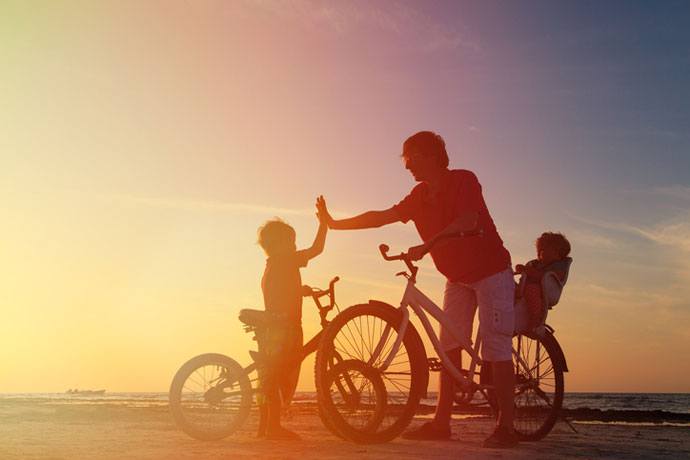
When we have concerns over our weight or general health and well-being, we are likely to reassess our eating habits and perhaps look into a gym membership. We are less likely to look into our transport choices, which are more likely to be made on the basis of cost and convenience. This makes little sense. Transport is a major factor in health. As we shall see, it has an impact on our waistlines, mental health and general well-being.
Most of the journeys we make are regular and predictable journeys – getting to work, dropping in on friends, picking the children up from school, meeting with business clients. Since these journeys are already planned and we know roughly when we need to be somewhere, we could kill two birds with one stone by travelling in a healthy way.
Simple changes can have real impact
Instead of taking the car to the retail park on the edge of town, perhaps you could take a walk into the town centre.
Instead of dropping the children to school by car, perhaps you could look into getting some bikes for the family. Your children will likely enjoy the independence cycling brings, and perhaps weekend leisure rides could become a fun and healthy family activity? Perhaps most importantly, you’ll be instilling in them active habits that will last a lifetime.

Maybe you could even get home from the office quicker on a bike by avoiding the traffic jams. Again, the bicycle offers convenience, whilst getting you fit without you noticing it – you can easily burn 200-500 calories on a 30-minute bike ride depending on your weight, current fitness level and number of hills on your route!
Why spend time and money on a gym membership that allows you to sit on a static cycling machine if you aren’t already making the most of the potential of cycling more of your regular journeys? Our ancestors didn’t have gyms or follow a health plan – getting around in an active way provides all the natural exercise we need. Now that so many of us have sedentary, desk-based jobs, getting this kind of natural activity into the day is even more important.
Is public transport healthy?
You might expect that the train or bus is not the healthful mode of transport for someone wanting to avoid illness – we’ve all been on public transport where someone is having a coughing or sneezing fit and wished it would end. Perhaps surprisingly, the opposite may be true.
A survey of 6,000 people by the London School of Hygiene and Tropical Medicine found that people with more frequent exposure to public transport environments, especially during younger years, had fewer bouts of illness and overall sick days compared with those who do not take public transport. It is suggested that this is because the mixed environment and exposure to germs in small doses boosts the body’s immune response. So next time you encounter a coughing fit on the bus, thank the person suffering on behalf of your immune system.
Cyclists are ill less often
Cycling is an ideal way of staying physically active without putting too much strain on your joints. Furthermore, reams of research has been published suggesting links between more cycling lowering the risk of developing conditions like diabetes, stroke and even cancer.
The Get Britain Cycling report has underlined NHS savings projected in line with an increasing uptake of cycling – it suggests that increased active travel could save the health service £17 billion within 20 years. More recently, research by Sustrans suggested that regular cyclists take as few as half the average number of days off work due to illness each year. Interestingly, their survey revealed cyclists take 2.4 sick days per year, compared to a national average of 4.5 – each sick day costing the employer around £258 in lost productivity.

Could the way you travel be making you unhappy?
Britain, along with much of the Western world, has a growing problem with mental health. It seems there is a threshold after which economic development stops contributing to the overall happiness of a nation, and mental health issues become more widespread. Of these, the most prevalent is major clinical depression – the most widespread mental health condition in the world and one growing especially fast among teenage and older (65+) age groups.
Depression can have a great many complex causes – stress, social isolation and fragmentation among them. What is less widely known about is the link between mental well-being, and inactivity. The World Health Organisation says we should do 30 minutes of moderate activity per day in order to remain healthy. This refers to more than simply physical fitness – even gentle exercise releases dopamine, which can reduce stress and encourage positive emotional responses.
Travelling by bicycle or on foot are the easiest ways to enjoy these benefits day-to-day (commuting, the shopping trips, the social visits, etc.). Ideally, you will also find time to walk in natural, leafy environments as these have also been found to have anxiety reducing effects.
ETA cycle insurance
For over 26 years the ETA has been working hard to encourage healthy and sustainable ways to travel. It’s the reason we developed ETA cycle insurance. In contrast with other providers, we offer a sympathetic policy on storage. As long as a shed door is locked, the bicycles stored within do not require any further security. In addition, the policy covers stolen quick-release components and for added peace of mind, claims are handled in-house. Furthermore, bikes are never devalued, no matter their age. Hardly surprising that The Good Shopping Guide voted us Britain’s most ethical insurance company 2016.

Simon Bailey, Researcher, Ultra Light Vehicles
Great article! Human-powered vehicles (bikes, velomobiles, etc.) offer many benefits.
Roger Birchall
How about a”Family” powered vehicle